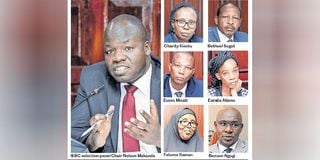Premium
IEBC panel drawing hefty perks a year on with little to show for

IEBC Selection Panel team says they are legally in office and only a court order or law change can stop the process.
What you need to know:
- The IEBC selection panel led by Makanda was appointed by President William Ruto through a gazette notice on February 27, 2023.
- According to the SRC remuneration guidelines, the chairman of the selection committee pockets Sh30,000 per day, while members take home Sh25,000.
The panel constituted to recruit the next commissioners of the Independent Electoral and Boundaries Commission (IEBC) months ago is enjoying what might have been an oversight by Parliament not to include timelines within which such an outfit should last.
The seven-member IEBC selection panel, chaired by Mr Nelson Makanda, representing the Inter-Religious Council of Kenya (IRC-K), began work on March 2, 2023, after being appointed by President William Ruto, but almost a year later, it is yet to complete its mandate.
This directly points to an impending constitutional crisis over the failure to meet the March 7, 2024 deadline for delimiting constituency boundaries due to the absence of IEBC commissioners to carry out the task.
According to the Salaries and Remuneration Commission (SRC) remuneration guidelines, the chairman of the selection committee pockets Sh30,000 per day, while members take home Sh25,000.
An amendment to the First Schedule of the IEBC Act in 2022 provided for a change in the composition of the selection panel tasked with filling vacancies at the commission whenever they occur.
However, what the two Houses of Parliament failed to realise was that it was important to include the timelines to enable the Commission to work and finalise its mandate without undue delay.
The structure of the IEBC Act is such that the timelines only apply when there is a vacancy in the Commission.
In this case, the respective nominating bodies for the selection panel have seven days from the declaration of a vacancy in the commission to submit their nominees to the Parliamentary Service Commission (PSC) for onward transmission to the President for appointment by gazette notice.
But once the commissioners are sworn in, they have no timeline to complete their work, meaning they could serve for five years or more and still be within the law.

IEBC Selection Panel members (from left) Novince Euralia Atieno, Evans Misati James, Charity Kisotu, Nelson Makanda, Bethuel Sugut, Fatuma Saman and Benson Ngugi Njeri at KICC, Nairobi, on March 6, 2023.
The timelines resurface once the panel has submitted its report to the President with recommendations for nominees to chair and serve on the commission.
"The President shall, within seven days of receipt of the names approved by the National Assembly, appoint the Chairperson and members of the Commission by notice in the Gazette," the IEBC Act states.
Considering that the law was passed by the National Assembly with the concurrence of the Senate without any amendments, it is not clear how the MPs failed to spot the loophole and address it.
Yesterday, the Majority Leader in the National Assembly, Kimani Ichung'wah, acknowledged the gap in the law and promised to address it through amendments to the IEBC Act when the House resumes tomorrow afternoon after a long Christmas break.
"Yes, there is an existing gap which we will address in the proposed new law to set a timeline within which they have to complete the process," Mr Ichung'wah, the Kikuyu MP, told the Nation.Africa.
Mr Bob Mkangi, a former member of the defunct Committee of Experts (CoE) that wrote the current Constitution, notes that the failure to include timelines to guide the selection panel was a big mistake.
"It may therefore not be out of place to propose strict timelines in the recruitment of commissioners to the IEBC, which in itself is undertaking mandates that are time-bound," says Mr Mkangi.
He adds that "while it is sometimes difficult to establish categorical timelines due to contingencies, the current intolerable disregard for the sovereignty of the people is a good reason for circumscription".
The vacancies at the IEBC have affected the conduct of several of the commission's activities, including the by-elections, the delimitation of boundaries, and the review of several policy documents, among others.
But even as Mr Ichung'wah assured of the amendment of the law, his Minority colleague in the House Opiyo Wandayi (Ugunja) said the IEBC selection panel is no longer useful to the country and should therefore be disbanded.
"The panel is moribund for all intents and purposes," said Mr Wandayi, a position shared by Mr Mkangi.
"The IEBC selection panel is definitely out of its depth considering the importance of the institution in question. The current context is crippled by the structural and functional integrity of the commission and the fact that the Constitution and the Interpretation and General Provisions Act abhor undue or unreasonable delay in the performance of duties," said Mr Mkangi.
The IEBC selection panel led by Makanda was appointed by President William Ruto through a gazette notice on February 27, 2023.
On March 2, 2023, the Selection Panel was sworn in before Chief Justice Martha Koome to officially commence its mandate, which includes inviting applications from eligible and qualified Kenyans, shortlisting and interviewing candidates.
The law empowers the selection panel to select two persons qualified to be appointed as chairperson and nine others qualified to be appointed as members of the IEBC and forward the names to the President.
From the list, the President has seven days to nominate one person for appointment as Chairman of the IEBC and six persons for appointment as members and forward their names to the National Assembly for consideration.
The other members of the IEBC selection committee are Ms Charity Kisotu (Public Service Commission), Mr Bethuel Sugut (Parliamentary Service Commission), Ms Novince Atieno (Parliamentary Service Commission), Mr Evans Misati (Political Parties Liaison Committee), Mr Benson Njeri (LSK) and Ms Fatuma Saman (IRC-K).
The vacancies at the IEBC arose after the terms of the chairman Wafula Chebukati and commissioners Abdi Guliye and Boya Molu expired in January 2023.
Three other commissioners - Ms Juliana Cherera (vice chairperson) and members Mr Justus Nyangaya and Mr Francis Wanderi - were forced out of office by political pressure immediately after the August 9, 2022 general elections, while Ms Irene Masit was removed from office by a tribunal formed by the President.
This means that the commission cannot function and, therefore, the deadline of March 7, 2024, by which the boundaries should have been demarcated, cannot be met.





